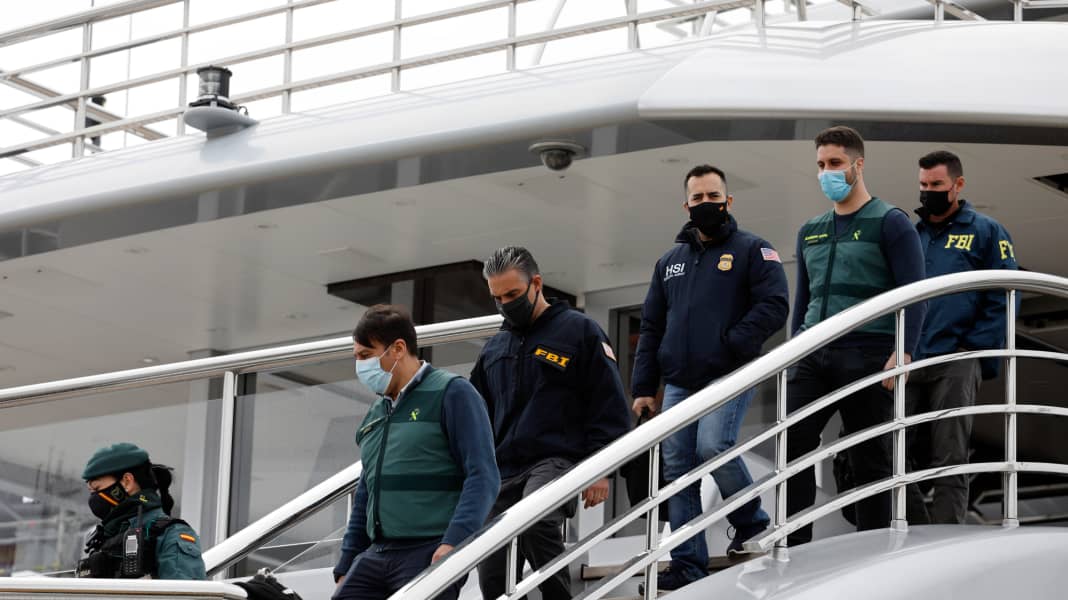Law: European yacht supply industry affected by sanctions for Russian citizens
Boote Exclusiv
· 08.05.2023

At the beginning of this year, an English citizen was arrested in Spain. The allegation: as a yacht manager, he had helped a sanctioned Russian oligarch to continue operating his yacht.
What exactly is the accused charged with? The press releases from the prosecution authorities reveal the following: The owner of the yacht, a Russian oligarch, was placed on the list of sanctioned persons. In order to prevent the freezing of economic resources including the yacht, it is alleged that the yacht changed its name and ownership structure. The accused yacht manager is said to have known about this or even participated in it.
The actions of the Spanish law enforcement authorities are not only noteworthy because, as far as can be seen, this is the first time they have taken action against service providers in the yacht sector who are accused of a sanctions offence. Rather, the explosive nature of the case arises from the fact that the Spanish law enforcement authorities did not investigate themselves, but instead complied with a request for mutual legal assistance from the United States. In other words: An English citizen has been arrested in Spain because, in the opinion of the US law enforcement authorities, he is alleged to have violated US law.
This raises a number of legal questions, completely separate from the facts of the case. First and foremost, one wonders why an Englishman in Spain has to comply with US sanctions law. After all, the so-called territoriality principle applies in criminal and sanctions law. According to this principle, the criminal power of a state is limited to the persons who are on its territory at the time of the offence. The assumption that a non-American in Spain is alleged to have violated US sanctions law therefore seems strange.
In order to understand the measures taken by the law enforcement authorities, it is necessary to familiarise oneself with US sanctions law, true to the principle of "no principle without exception".
What types of US sanctions are there?
In US sanctions law, a distinction is made between primary and secondary sanctions.
ThePrimary sanctions are effective against all natural persons and legal entities residing in the USA (territoriality principle) and - irrespective of their place of residence - against all US citizens (personality principle).
The so-calledSecondary sanctions are intended to apply US law beyond US national borders - not only to US citizens, but to everyone. Secondary sanctions therefore extend the primary sanctions by specifically expanding the group of people targeted by the sanctions and allowing the sanctions law to be applied extraterritorially.
Unsurprisingly, the legality of secondary sanctions is highly controversial. On paper, secondary sanctions are a blatant violation of the principle of territoriality. Accordingly, the European Community already made it clear in 1996 in connection with the US sanctions against Iran that it considers US secondary sanctions addressed to citizens of European Community member states to be contrary to international law. In response to the secondary sanctions, it issued a so-called Blocking Regulation, which explicitly prohibits EU citizens from complying with US secondary sanctions.
This in turn leads to the dilemma that an EU citizen either violates US secondary sanctions (i.e. if he or she disregards the relevant provision of US law) or the EU Blocking Regulation (i.e. if he or she complies with the US secondary sanctions). A violation of secondary sanctions can lead to punitive measures such as exclusion from the US financial market, restriction of access to other US economic areas, freezing of assets located in the US or entry bans. A violation of the Blocking Regulation can result in a fine of EUR 500,000.
In practice, this dilemma is resolved by the affected party applying to either the EU or OFAC (the authority responsible for sanctions enforcement in the US) for a waiver.
Scope of application of the Russia sanctions
The defendant named in the case mentioned at the beginning does not have the option of applying for a special authorisation. For one thing, such authorisation must be obtained before the "offence" (if one exists). Secondly, the US law enforcement authorities are not invoking secondary sanctions in this case.
On the contrary, the USA has not (yet) issued any secondary sanctions as part of its Russia sanctions. However, it has extended the scope of its primary sanctions to such an extent that not only US citizens and persons on US territory are affected, but also third parties.
The scope of application of the US-Russia sanctions always applies if the US dollar was used as a means of payment in the context of the facts of the case or if US goods are affected. While the non-use of the US dollar in transactions with Russian business partners would still be relatively straightforward to implement, the identification of US goods is a complex endeavour. When identifying US goods, care must be taken to ensure that the proportion of components originating from the USA does not exceed the materiality threshold of ten per cent (!), even for goods manufactured outside the USA. Furthermore, under the relevant US Russia sanctions, not only persons with US citizenship are treated as US persons, but also any foreigner who has a US residence permit or is in the USA for private or business purposes.
In light of this broad scope of application, it is not surprising that the US law enforcement authorities in the aforementioned case accuse the defendant of having operated the yacht "through the use of the US financial system". The accusation also states that the operation of the yacht required "its internet, technology, weather forecasting and computing systems, as well as the trappings [...], including its satellite television, luxury goods, and teleconferencing software", all of which are "U.S.-origin products".
It remains to be seen to what extent the Spanish authorities will comply with the US prosecution authorities and extradite the accused to the USA. What is certain, however, is that the applicability of US sanctions law to persons in Europe is not excluded from the outset. This is because, unlike in the case of secondary sanctions, the application of primary US sanctions against Russia is not - at least as things stand today - prohibited in Europe from the outset.
Experts for all questions of yacht law

The yacht lawyers Dr Tim Schommer (tim.schommer@clydeco.com) and Dr Volker Lücke (volker.luecke@clydeco.com) have been advising yacht clients from Germany and abroad for over 18 years. They advise on the planning and construction phase, the purchase and sale, the owner structure, yacht operation including insurance, crewing and charter as well as the handling of damage and third-party claims.

